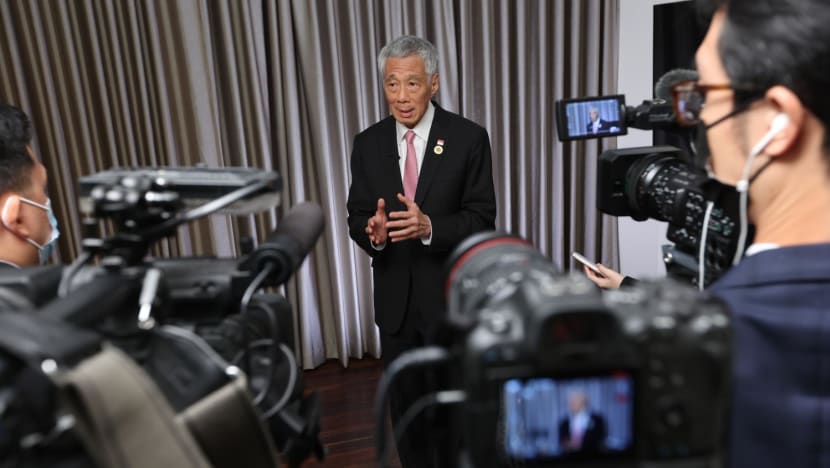China has to engage CPTPP members and work out issues before joining trade pact: PM Lee

Prime Minister Lee Hsien Loong speaks to the media at the ASEAN Summit in Phnom Penh on Nov 13, 2022. (Photo: MCI)
PHNOM PENH: China will have to engage the members of a trans-Pacific trade pact and work out its issues with them before its application to join the pact can go ahead, said Singapore Prime Minister Lee Hsien Loong on Sunday (Nov 13).
Mr Lee was answering questions from Singapore media at the close of the ASEAN summit held in the Cambodian capital of Phnom Penh.
Responding to a question about China's bid to join the Comprehensive and Progressive Trans-Pacific Partnership (CPTPP), Mr Lee said that the outcome of the country's application is "not known".
Singapore has said that it supports China's interest in joining the CPTPP in principle, he said.
"Of course, China will have to meet the high standards which are expected of all the members but that is something which has to be established and worked out between China and all the members of the CPTPP," Mr Lee added.
One of the world's largest multilateral trade pacts, the CPTPP has 11 members: Singapore, Canada, Australia, Brunei, Chile, Japan, Malaysia, Mexico, New Zealand, Peru and Vietnam.
China submitted an application to join the partnership in September last year.
The trade pact requires members to adhere to high standards on labour rights, intellectual property protection and trade rules, among other conditions.
Mr Lee explained that the CPTPP is, by design, an "open and inclusive agreement", but to join the CPTPP, there are procedures, rules and regulations to follow, which are spelt out in the CPTPP agreement.
On matters to do with accession, the decision is made by a consensus of all the existing members of the partnership. In particular, the formal decision to start the accession process depends on consensus among the partners.
"Therefore what China has to do is to engage the partners individually and talk to them and work out any issues they may have with the partners individually," said Mr Lee.
"If that process is completed, then, if there's a consensus it can go ahead."
As this year's chair of the CPTPP committee, Singapore will carry out its role "objectively and impartially", said Mr Lee.
"That's how it has to work, and that's our public position. I've stated it several times. And when I met Premier Li Keqiang I explained it to him again."
Mr Lee had several bilateral meetings during the ASEAN Summit, including one with the Chinese premier on Friday.
During the meeting, they affirmed the excellent ties between Singapore and China, and discussed regional and international issues of mutual concern, including the state of the global economy, a spokesperson from the Prime Minister's Office said.
Related:
When asked about an upcoming meeting between Chinese President Xi Jinping and United States President Joe Biden, taking place on Monday during the G20 summit in Bali, Mr Lee said he hopes that the meeting will stop the deterioration in US-China relations.
While the two world leaders have spoken online, this is the first time they will be meeting in person since Mr Biden took office in January 2021.
"The tone has to be set right at the top and that means the presidents of the two countries - they have to speak, be frank and lay out their cards. And I think they understand what the stakes are but to take it forward, that takes political will and wisdom on both sides," said Mr Lee.
Mr Lee will also attend the G20 summit in Bali, right after the ASEAN summit in Phnom Penh, which was the first to be held in-person since the COVID-19 pandemic.
He spoke to reporters immediately after the East Asia Summit with 17 other world leaders, including Mr Biden, on the last day of the meet in Cambodia.
"To deal with really difficult problems, you have to meet face-to-face, engage, negotiate, deal, and eventually reach a settlement," said Mr Lee.
"And I think that's been very useful this time - we've had to deal with issues like Myanmar, we've had to deal with the Timor-Leste's application to join ASEAN," he said.
He said that ASEAN has also been talking about expanding and deepening cooperation among members.
"Unless ASEAN can cooperate with one another effectively, we are not going to be able to maintain ASEAN centrality, and we will not be valuable to our partners," he said.
ASEAN upgraded relations with India and the US to Comprehensive Strategic Partnerships, while a free trade pact with Australia and New Zealand was also improved.
The bloc is also negotiating upgrades to the ASEAN-China free trade agreement.
"These are all substantive, tangible projects, which will make ASEAN more valuable to its members and to its partners," Mr Lee said.

















